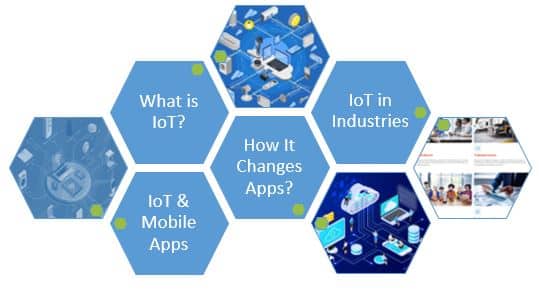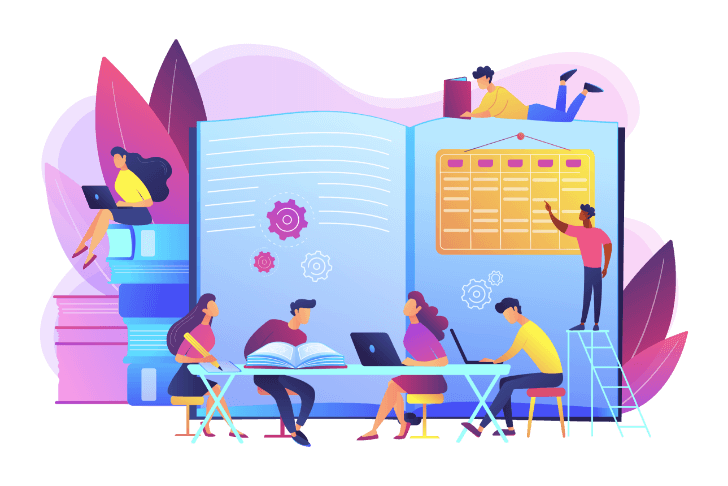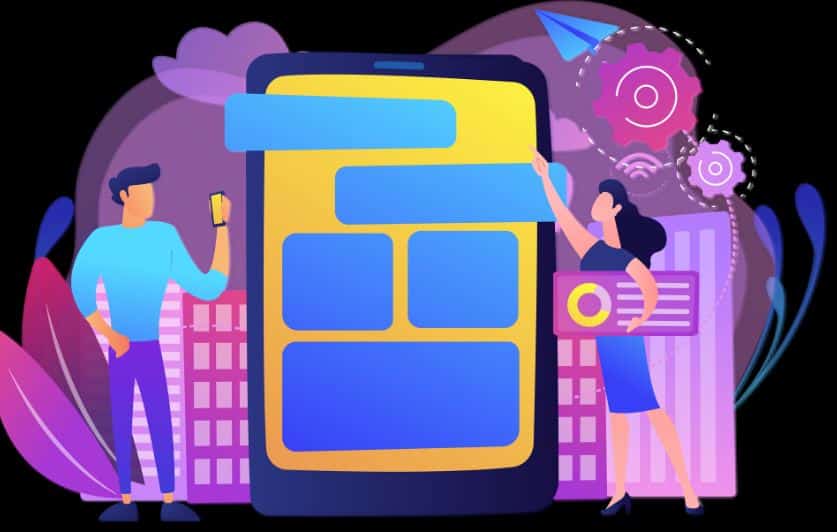Table of Contents
ToggleIn today’s hyper-connected world, the Internet of Things (IoT) is a game-changer, redefining how devices interact and communicate. With billions of devices expected to connect through IoT in the coming years, its influence on businesses around the world is undeniable. IoT mobile app development is the domain where most users will be handling their day-to-day activities. Mobile apps serve as the gateway for users to interact with IoT devices, unlocking endless possibilities across industries.

What is IoT?
The Internet of Things (IoT) refers to a network of interconnected devices that communicate, share data, and operate collaboratively. These devices range from smart home gadgets like thermostats and security cameras to wearables like fitness trackers and advanced machinery.
IoT devices use communication technologies such as Wi-Fi, Bluetooth, and Zigbee to transmit data seamlessly. For example, a smart fridge can notify you about expired food items, or a wearable can track your heart rate in real time.
IoT and Mobile Apps
Mobile apps serve as the central interface for interacting with IoT devices. They act as both a control panel and a data hub, empowering users to:
1. Monitor Device Performance
Users can keep track of the status and performance of their IoT devices, such as checking live feeds from security cameras or monitoring the battery level of a wearable device.
2. Control Settings Remotely
Mobile apps provide the ability to remotely control various settings of IoT devices. It includes adjusting the temperature of a smart thermostat, turning on or off smart lights, or locking and unlocking smart doors.
3. Access Real-Time Insights
IoT devices generate a wealth of data, and mobile apps allow users to access and analyze this data in real time. For example, fitness tracking apps can display heart rate data, sleep patterns, and calorie consumption. In contrast, vehicle diagnostic apps can provide information on fuel efficiency and engine performance.
How is IoT Changing Mobile App Development?

On one side, IoT is changing mobile apps that make it convenient and versatile for users to manage their smart devices. On the other hand, it enables businesses to measure performance, optimize workflows, and automate processes. Here is a review of the limitless potential:
1. Focus on Security
IoT devices handle sensitive personal and business data. Developers implement robust security protocols like encryption, two-factor authentication, and secure APIs to protect against breaches.
2. Data Collection and Analysis
IoT generates vast amounts of data, requiring advanced analytics to extract actionable insights. Mobile apps must integrate seamlessly with big data solutions for processing and visualization.
3. Enhanced User Experience
IoT enables apps to deliver highly personalized and context-aware experiences. For instance, a smart thermostat app adjusts room temperature based on user preferences and weather data.
4. Increased Demand for Hybrid Apps
Hybrid apps, designed to work across multiple platforms, offer flexibility and cost-efficiency, making them ideal for IoT ecosystems that span diverse devices.
5. Reduced Human Effort
Automation simplifies daily tasks. For example, IoT-enabled apps can auto-schedule routines like watering plants or locking doors based on user-defined triggers.
6. Cost-Effective Solutions
Cloud integration minimizes infrastructure costs, enabling real-time data storage and app updates without expensive hardware investments.
7. Development Complexity
IoT apps face compatibility challenges due to varying protocols and platforms. Developers must adopt standardized frameworks and APIs for smooth functionality.
8. Expanded Connectivity Options
IoT extends connectivity beyond Wi-Fi and Bluetooth, leveraging NFC, RFID, and proprietary protocols to enhance app-device interaction.
9. New Business Opportunities
IoT fosters innovation in industries like healthcare (remote patient monitoring), agriculture (smart irrigation), and automotive (connected vehicles).
10. Non-Profits and Governments
The benefits of the technology reach beyond homeowners and businesses, as non-profits and governments might also use it. It offers continuous monitoring, remote control, and performance optimization that help in managing charitable proceeds, processes, and even cities.
Industries Benefiting from IoT Mobile App Development
Although many industries are reaping the benefits of IoT applications, which are beyond the scope of this blog. However, we will cover the most impactful ones that we at Unique Software Development are serving to achieve more.

1. Healthcare
In healthcare, IoT mobile apps and web apps by Unique Software Development enable real-time patient monitoring, telemedicine, and streamlined care delivery. Devices such as wearable sensors collect vital signs, while mobile apps analyze and share data with healthcare providers for timely interventions. It enhances patient outcomes and operational efficiency in hospitals.
2. Transportation
IoT solutions for transportation improve logistics, fleet management, and commuter experiences. Unique Software Development creates mobile apps that integrate GPS, sensors, and vehicle telematics to track fleets, optimize routes, and ensure timely deliveries. Real-time monitoring enhances safety and reduces fuel costs, empowering businesses and commuters alike.
3. Social Media
IoT redefines social media by connecting devices and creating new avenues for interaction. Unique Software Development builds apps that integrate IoT devices, such as wearables, to share fitness stats, health goals, or location updates seamlessly. They make social interactions more dynamic and engaging.
4. Professional Services
For professional services, Unique Software Development’s IoT apps streamline workflows by enabling remote device management, predictive maintenance, and data-driven insights. It fosters productivity, reduces downtime, and ensures seamless service delivery across sectors.
Trends in IoT Mobile App Trends 2025
The latest trends in IoT mobile applications are either the fusion of IoT with other cutting-edge technologies or its diverse applications. Here is a brief explanation of the latest IoT trends in 2025.
1. AI and ML Integration
Artificial Intelligence (AI) and Machine Learning (ML) empower IoT mobile apps with predictive capabilities and real-time decision-making. By analyzing vast data from connected devices, apps can predict user behavior, detect anomalies, and automate processes. For instance, AI-driven IoT apps can optimize energy usage in smart homes or provide personalized insurance quotes through wearables.
2. Cloud Integration
Cloud technology is pivotal in IoT mobile apps, offering scalable and cost-effective data storage and processing. Cloud platforms enable seamless communication between IoT devices and mobile apps, ensuring real-time data synchronization and analytics. They reduce dependency on local infrastructure, enhance app reliability, and support remote updates, besides SaaS solutions.
3. Business Intelligence
IoT mobile apps are increasingly incorporating Business Intelligence (BI) tools to extract actionable insights from device data. BI tools allow businesses to monitor performance metrics, optimize operations, and predict trends, providing a competitive edge across industries.
4. AR and VR Fusion
Augmented Reality (AR) and Virtual Reality (VR) enhance IoT apps by providing immersive experiences. For example, AR-enabled IoT apps can overlay repair instructions on equipment, while VR integration offers virtual training simulations in connected environments, improving user engagement and productivity.
5. Smart Homes
In smart homes, IoT integrates devices like thermostats, lights, cameras, and appliances to create a seamless living experience. Homeowners can control systems remotely using mobile apps, voice commands, or automation. For instance, a smart thermostat adjusts room temperatures based on occupancy, while smart cameras provide concurrent surveillance. IoT enhances energy efficiency by automating lights and appliances, significantly reducing waste and utility costs.
6. Smart Offices
IoT revolutionizes workplaces by fostering collaboration, boosting productivity, and streamlining operations. Smart office systems use IoT sensors to monitor occupancy, optimize space usage, and manage energy consumption. For example, IoT-enabled meeting rooms can automatically book spaces, adjust lighting, and control audiovisual equipment based on schedules. Wearable devices track employee wellness while connected HVAC systems maintain optimal comfort. Such advancements enhance employee satisfaction and operational efficiency.
7. Smart Warehouses
IoT plays a pivotal role in smart warehouses by automating inventory management, logistics, and operations. RFID tags and IoT sensors track goods in real time, enabling accurate inventory updates and reducing losses. Autonomous robots and IoT conveyor systems streamline sorting, picking, and packing processes. Environmental sensors ensure proper storage conditions for temperature-sensitive goods, minimizing spoilage. These technologies improve supply chain efficiency, reduce costs, and boost productivity.
8. Smart Cities
On a broader scale, IoT drives the development of smart cities by addressing urban challenges such as traffic congestion, energy consumption, and waste management. IoT-enabled traffic lights and connected vehicles optimize traffic flow, reducing commute times and emissions. Smart grids monitor energy usage, integrating renewable sources and minimizing blackouts. IoT sensors in waste bins signal collection services when full, improving sanitation and resource allocation. IoT surveillance systems and emergency response coordination ensure Public safety.
Conclusion
IoT is revolutionizing mobile app development by bridging the gap between the physical and digital worlds. It is not only allowing machine-to-machine communications but also enabling them to communicate with people. Businesses and developers that embrace this technology stand to gain a competitive edge in delivering innovative, user-centric solutions. By harnessing IoT mobile app development, we can transform industries and redefine convenience in everyday life. If you want to capitalize on the opportunities in IoT mobile app development or IoT mobile app trends, contact Unique Software Development now.









